Timeline: Turkish military operation in Syria’s Afrin
The Turkish military launched its ongoing cross-border offensive in Syria’s northwestern region of Afrin against the Kurdish People’s Protection Units (YPG) late last month.
Ankara views the YPG as the Syrian branch of the militant Kurdistan Workers' Party (PKK) that has been fighting for an autonomous region inside Turkey since 1984.
Turkish President Recep Tayyip Erdogan has repeatedly said that Afrin should be cleared of “terrorists,” and demanded the deployment of Turkish troops there during a speech back in November 2016.
This is while US officials regard the YPG as the most effective fighting force against the Daesh Takfiri terrorist group in northern Syria, and have substantially increased their weaponry and technology support to the terrorist group.
The controversy over a possible Syria border force first started on January 14 when a report emerged on Reuters saying that the military coalition led by the United States in Syria was planning to set up a large border force of up to 30,000 personnel with the aid of its militia allies.
Below is a sequence of the Operation Olive Branch.
January 20
Turkey’s official Anadolu news agency reports that Turkish military aircraft have bombarded YPG positions.
Turkish Prime Minister Binali Yildrim confirms that Ankara has started an offensive against the US-backed Kurdish forces.

Turkey’s President Recep Tayyip Erdogan says that the Operation Olive Branch has begun.
Turkey-backed militants from the so-called Free Syria Army area under the YPG control via the northwestern Syrian city of Azaz, located roughly 32 kilometers (20 miles) northwest of Aleppo.
The Russian Foreign Ministry expresses concern over the launch of the operation in Afrin, stating, “We are closely monitoring the development of the situation.”
The Russian Defense Ministry announces in a statement that Russian troops in Afrin have been moved to the town of Tell Rifaat, located roughly 40 kilometers (25 miles) north of Aleppo over safety concerns.
The Syrian government condemned the “brutal Turkish aggression” against Afrin, rejecting Ankara’s claim about having informed Damascus of the operation.
Damascus "strongly condemns the brutal Turkish aggression on Afrin, which is an inseparable part of Syrian territory," Syria’s official news agency, SANA, cites a Syrian Foreign Ministry source as saying.
“Syria completely denies claims by the Turkish regime that it was informed of this military operation,” the source added.

Turkish Foreign Minister Mevlut Cavusoglu says Operation Olive Branch is aimed at ensuring Turkey’s border security and eradicating terrorism in the area.
Turkish battle tanks enter Syria via Turkey’s south-central city of Kilis.
January 21
Rockets fired from Syria struck the center of Kilis. At least one person is reported to have sustained injuries.
Free Syrian Army militants launch an operation in Afrin.
France demands a United Nations Security Council emergency meeting over Syria situation.
The Turkish General Staff says in a statement that Turkish fighter jets have pounded 153 YPG positions in Afrin.

Turkish military forces and allied Free Syrian Army militants start a joint ground operation.
Yildirim says the operation in Syria’s Afrin will consist of four phases, and that Turkey plans to establish a safe zone about 30 kilometers deep.
The so-called Syrian Observatory for Human Rights (SOHR) reports that Turkish troops and YPG forces have engaged in skirmishes in the northern and western outskirts of Afrin.
Addressing people in the western Turkish city of Bursa, Erdogan says the operation in Afrin will wrap up “in very short time.”
Turkish Chief of General Staff Hulusi Akar says that military forces have taken necessary measures to avoid civilian casualties.
January 22
US Secretary of State Rex Tillerson voices Washington’s concern about Turkey’s offensive in northern Syria, asking both Ankara and YPG forces to exercise restraint.
Turkish military officials say they have captured nearly a dozen villages as well as several hilltops from the YPG.
European Union foreign policy chief Federica Mogherini says she is “extremely worried” about Turkey's Afrin operation.
The Turkish army says a Turkish soldier has died during clashes in Gulbaba village southeast of Kilis.
The UN Security Council holds a meeting on Turkey’s offensive.
January 23
US Defense Secretary Jim Mattis calls on Turkey to show "restraint" in its offensive against YPG militants in Syria.
Two more Turkish soldiers die during Operation Olive Branch.
Turkey’s Chief of General Staff says at least 260 YPG terrorists have been neutralized in Afrin. The military generally uses the term "neutralize" to signify that the militants were killed, captured or surrendered.
January 24
Turkish Presidential spokesman Ibrahim Kalin tells English-language CNN television news network that Turkey would like to see the US cease its support for the YPG.

Turkish authorities detained 150 suspects for opposing Operation Olive Branch, and conducting “propaganda” through various social media networks.
The Turkish General Staff says at least 287 YPG fighters have been neutralized since the beginning of the operation in Afrin.
Erdogan and his US counterpart Donald Trump discuss the Turkish military operation in Afrin over the phone.
The Turkish leader asks Washington to stop providing munitions to YPG terrorists in Syria.
January 25
Turkish Foreign Minister Mevlut Cavusoglu says Ankara and Washington cannot discuss a potential "safe zone" in Syria as long as there is mistrust between the two North Atlantic Treaty Organization (NATO) partners.
January 26
Turkey's Minister of Health Ahmet Demircan said three Turkish soldiers and 11 Free Syrian Army (FSA) militants have been killed since the beginning of the operation.
January 27
The week-long fighting has claimed lives of 13 FSA Takfiris besides injuring 121 others.

US Security Adviser HR McMaster confirms that Washington will not give weapons to YPG forces.
January 28
The Turkish military says five Turkish soldiers and 15 Free Syria Army militants have been killed so far in Operation Olive Branch.
Turkish Armed Forces say that 484 terrorists have been "neutralised" in the on-going Operation Olive Branch so far.
Turkish Armed Forces said on Sunday that 557 terrorists have been 'neutralised' as part of ongoing Operation Olive Branch in Syria.
January 29
Turkey's Interior Ministry announces in a statement that 311 suspects have been arrested so far for making “terror propaganda” on the Internet against Afrin operation.
The Turkish Air Forces says they are not using internationally-banned chemical or biological munitions in the Afrin campaign.
The Turkish military notes that it does not plan to target religious, cultural, historical and archaeological sites.
January 30
Eleven senior members of Turkey’s Medical Association are taken into custody, after the organization expressed opposition to the offensive in Afrin.

The crew members of Iran’s English-language television news network Press TV come under attack in Rajo town of Syria’s northern Afrin region as they are covering Turkey’s military operations.
January 31
The Turkish Armed Forces announces that 712 terrorists have been neutralized since the onset of Afrin operation.
Two rockets fired from YPG positions in Afrin hit a house in the southern Turkish town of Reyhanli near the country's border with Syria. There are no reports of casualties.
Turkish warplanes bombard YPG positions in Darmiq Mountain following the rocket attack.
French President Emmanuel Macron says Turkey’s military operation in Afrin must not serve as an excuse to invade Syria, asking the Ankara government to coordinate its action with its allies.
Yildirim stresses that Turkey's operation in Afrin seeks to clean the region from terrorists.
February 1
Erdogan says a total of 800 terrorists have been killed in Syria's northwestern region of Afrin region as part of Operation Olive Branch.
February 2
The Turkish Armed Forces say six YPG positions have been destroyed by aerial bombardment overnight.
Three rocket attacks target Turkey’s border towns of Reyhanli and Kilis. One civilian is killed and ten others are injured.
Turkish military forces establish control over the strategic Darmik mountain, and hoist a Turkish flag there.
Ankara's Ambassador to Washington, Serdar Kilic, says the US is making a mistake by aiding YPG terrorists.
The governor's office of Turkey’s southern province of Hatay says two civilians have been killed and nineteen others injured as six rockets landed in Reyhanli.
February 3
The Turkish president says Turkish troops are getting closer to Afrin center.
At least nine civilians are injured when YPG terrorists fire several missiles from Afrin on a marketplace in Azaz town.
Turkey’s armed forces say five Turkish soldiers are killed as an anti-tank missile hits their battle tank in Syria’s Afrin region.
February 4
Turkish Deputy Prime Minister Bekir Bozdag says if YPG forces do not leave Syria's strategic city of Manbij, Turkish troops will move there and towards the eastern bank of Euphrates River.

Turkish soldiers and allied Free Syrian Army militants seize Haruz Hill in northern Afrin.
February 5
Turkey releases on probation of all eleven executives of the Turkish Medical Association, whom were arrested after denouncing Operation Olive Branch.
A Turkish soldier is killed after YPG terrorists launch a mortar attack in Kuri area on the outskirts Afrin. A total of 16 Turkish soldiers have been killed since the beginning of the operation.
February 6
Erdogan says US troops should leave Syria’s northern city of Manbij, located 30 kilometers west of the Euphrates.
February 7
Turkish Foreign Minister Mevlut Cavusoglu visits Tehran and meets with his Iranian counterpart Javad Zarif. The top diplomats discuss the latest developments in Syria’s Afrin and Idlib.

February 8
Russian President Vladimir Putin and his Turkish counterpart Recep Tayip Erdogan agree to strengthen Ankara-Moscow military and security coordination in Syria during a phone call.
Speaking at an event at the presidential palace, Erdogan strongly rejects the calls made by leader of the country’s main opposition group Republican People's Party (CHP), Kemal Kilicdaroglu, to establish contact with the Damascus government.
February 9
Turkey’s AK Party spokesman Mahir Unal says at a news conference that 400 Daesh prisoners have been released in the northern Syrian cities of in Raqqah, Afrin and Dayr al-Zawr on the condition that they will fight against Turkish soldiers.
February 10
At least 11 Turkish soldiers are killed in separate incidents, making it the deadliest day since the start of Operation Olive Branch.
President Recep Tayyip Erdogan says a Turkish military helicopter is downed in southern Hatay province during the military campiagn in Syria's Afrin region.
He stresses that the perpetrators will pay a heavy price for their action.
February 11
US National Security Adviser H.R. McMaster meets with Turkish presidential spokesperson Ibrahim Kalın in Istanbul amid tensions between the two countries in the wake of Ankara’s offensive in Syria.
“The priorities and sensitivities of both the US and Turkey were discussed, in addition to overall relations, common strategic challenges and regional developments,” Turkey’s pro-government and English-language Daily Sabah newspaper writes in a report.
February 12
The Turkish Interior Ministry says 474 people have detained for promoting the YPG and PKK on their social media accounts, and 192 people for attending the protests against the Turkish military's operation in Afrin.
The Pentagon allocates 550 million dollars in its 2019 budget for the so-called Syrian Democratic Forces (SDF).
A total of 300 million dollars will be used for their training and munitions, while another 250 million will be used for the Kurdish border security force.
Turkish prosecutors open a probe into the speech made by the new co-leader of the country’s pro-Kurdish Peoples' Democratic Party (HDP) Pervin Buldan.
Buldan is being investigated for possible violation of Turkey's sedition laws and for allegedly engaging in terror propaganda.
The chief prosecutor in Ankara also accuses Buldan of describing the operation against a Kurdish militant group in Syria as an attack on civilian Kurds.
Turkish Foreign Minister Mevlut Cavusoglu says Ankara's ties with Washington will either be mended or severed.
Cavusoglu adds, “The US is not touching Daesh members in Syria as an excuse to continue working with YPG terrorist group.”

The YPG announces in a statement that the Kurdish forces have struck a Bayraktar TB2 medium altitude and long-range drone as it was on a reconnaissance mission over Qodeh village of Afrin.
February 13
Addressing members of his ruling Justice and Development Party (AK Party) in parliament, Erdogan criticizes Washington for supporting YPG militants.
“Our ally’s decision to give financial support to the YPG... will surely affect the decisions we will take,” the Turkish leader said.
Erdogan discusses his country's latest military operations in Syria with Saudi Arabia's King Salman bin Abdulaziz .
The two leaders stress the importance of Syria's territorial integrity and the significance of a political solution to the conflict in Syria.
February 14
US Director of National Intelligence Daniel Coats expresses concern over Turkey's ongoing military operation in Syria.
February 15
Seven Turkish soldiers are injured during the ongoing operation in Afrin, according to a Turkish General Staff statement.
The statement said the soldiers were injured in two different clashes.

Turkish Defense Minister Nurettin Canikli says he has urged his American counterpart Jim Mattis to stop supporting YPG militants, and to remove the so-called Syrian Democratic Forces (SDF) from the US-led coalition purportedly fighting the Daesh Takfiri terrorist group in Syria.
Erdogan conveys his priorities and expectations on Syria during a meeting with US Secretary of State Rex Tillerson in Ankara.
A US State Department spokesman travelling with Tillerson says the top US diplomat and the Turkish president had a “productive and open” talk.
“The two engaged in a productive and open conversation about a mutually beneficial way forward in the US-Turkey relationship,” he says.
February 16
Turkish armed forces shell YPG strongholds across the border towns of Reyhanli, Kirikhan and Hassa.
February 17
Turkish military says the number of the terrorists neutralized since start of Operation Olive Branch in Afrin has risen to 1,595.
It adds that 674 YPG targets have been destroyed in airstrikes carried out by Turkish military aircraft.
The Turkish General Staff states that one more soldier has been killed during Operation Olive Branch. The total number of soldiers killed during the operation rises to 32.
February 18
Turkish foreign minister says Turkey has never used internationally-banned chemical weapons in its operations in Syria.
Mevlut Cavusoglu tells reporters at the Munich Security Conference that Ankara has taken the utmost care to protect civilians in the cross-border military operation.
"It's just a fabricated story. Turkey has never uses any kind of chemical weapons," Cavusoglu says.
Cavusoglu dismissed the reports of chemical weapons use as propaganda by Kurdish organizations close to PKK.
Elsewhere in his remarks, Cavusoglu also accuses the Kurdish People’s Protection Units of using civilians as "human shields" in areas under its control.

February 19
Turkey's Foreign Minister Mevlut Cavusoglu says Turkish military forces will confront any Syrian pro-government forces entering the Kurdish-controlled enclave of Afrin to protect the US-backed YPG militants.
“If the regime (Syrian government troops) enters here [Afrin] to clear it of the YPG/PKK, then there is no problem. But if the regime enters here to protect the YPG, then nothing can stop us (the Turkish army). This goes for Afrin, as well as Manbij and the eastern bank of the Euphrates,” he says.
February 20
Turkey's presidential spokesman Ibrahim Kalin writes on his Twitter page that the Operation Olive Branch will continue as it was planned.
Russian Foreign Minister Sergei Lavrov says the situation in Syria's Afrin could be resolved through direct dialogue between Damascus and Ankara.
Reuters reports that Syrian pro-government fighters from popular defense groups have started to enter Afrin via the country’s northwestern city of Aleppo.
Syria’s state-run TV says Turkish forces are shelling the area where pro-government forces have entered Afrin.
Popular defense groups fighters pull back about 10 kilometers away from Afrin following shots from Turkish forces.
US Department of State spokeswoman Heather Nauert says Washington is not providing ammunition to anyone in Afrin, and American troops are not operating there.
Turkish officials release the former co-leader of the country’s main pro-Kurdish party, whom they had arrested a week ago over her opposition to Ankara’s ongoing cross-border offensive in Afrin.
The Peoples' Democratic Party (HDP) says in a post published on Twitter that Serpil Kemalbay has been set free.
February 21
The Turkish General Staff says in a statement that a total of 1,780 YPG terrorists have been neutralized since the launch of Operation Olive Branch in Syria's northwestern Afrin region.
The Turkish presidential spokesman warns that any force, including Syrian government soldiers, coming to the help of the Kurds in Afrin would be considered a “legitimate target” for the Turkish military.
“Every step taken in support for the YPG terror organization would mean (any forces intervening on the Kurdish militants' side) are on the same level as terror organizations. And for us, that would make them legitimate targets,” said Kalin, adding, “It doesn't matter who makes such an attempt, there will be serious consequences.”
YPG militants shell Kirikhan district in Turkey's border province of Hatay. A Turkish military source, speaking on condition of anonymity, says two mortar shells were fired from Afrin region. No casualties are reported.
VIDEO | TikTok ban
VIDEO | In Nigeria, more than 100 inmates escape after rain damages prison
Moscow may downgrade ties with US if assets are confiscated: Russia
Houthi: US complicit in all Israeli crimes against Palestinians in Gaza
‘Europe could die’, President Macron warns at Sorbonne University
Palestinians released from Israeli jails recount horrible ordeal
'Unprecedented': Thousands of flights cancelled in Europe amid strike
Iran urges US to stop support for Israel as university revolt spreads



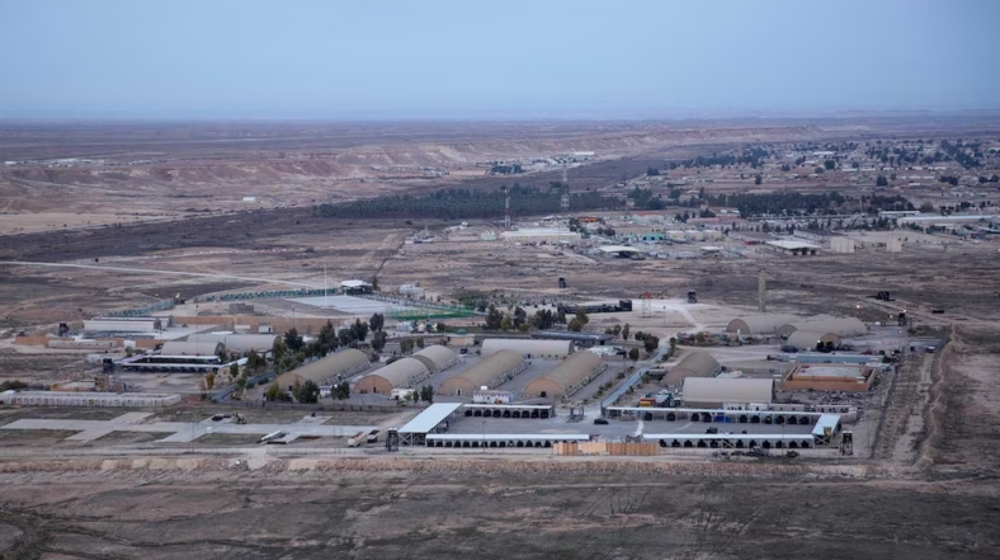
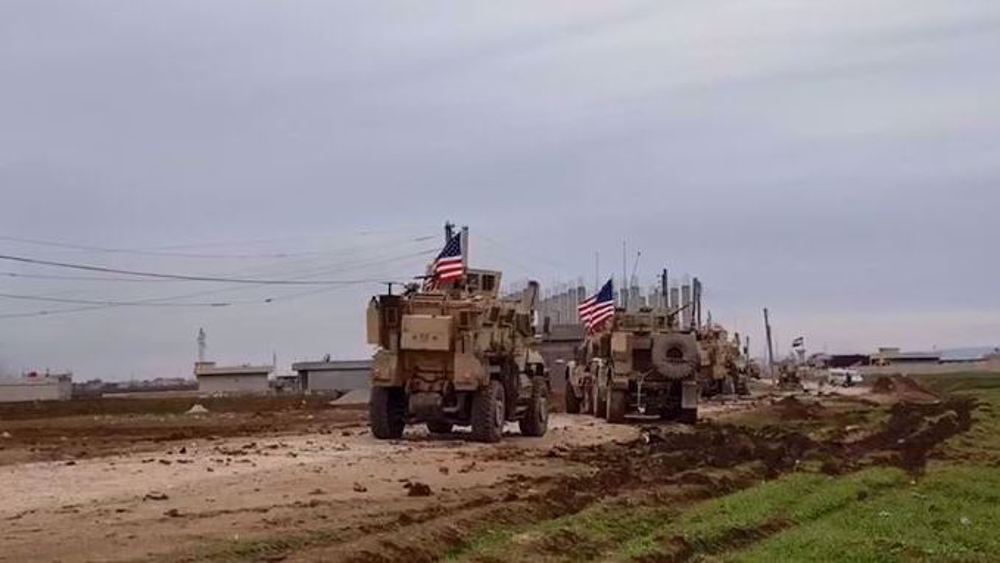
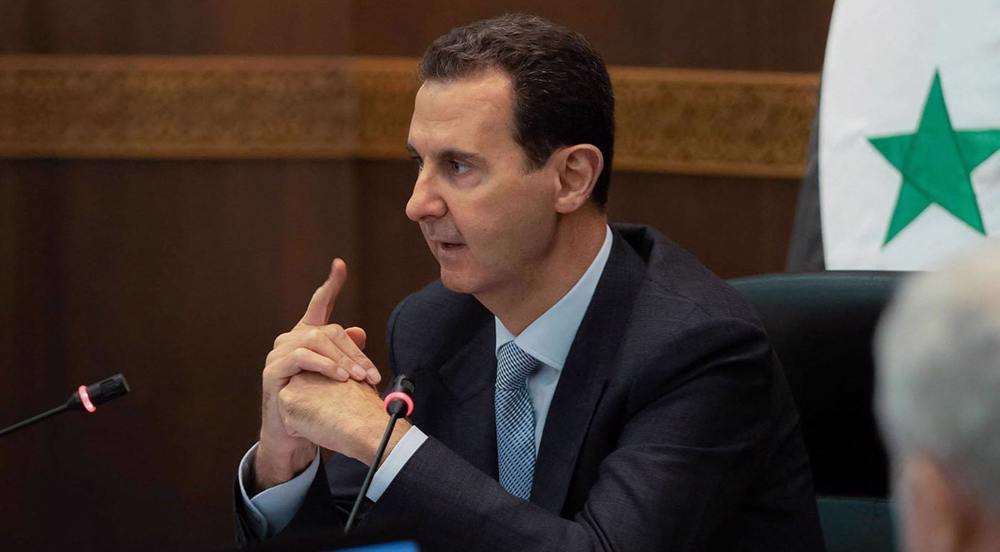





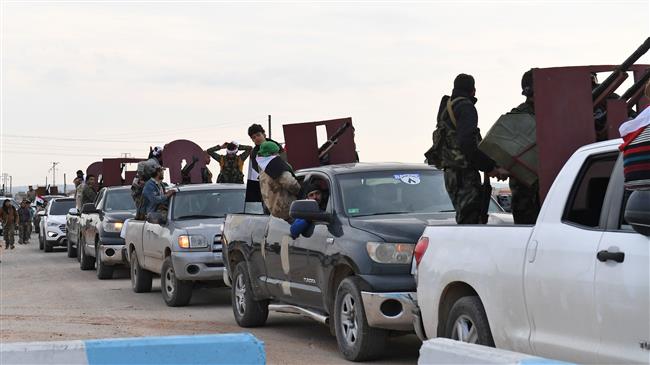




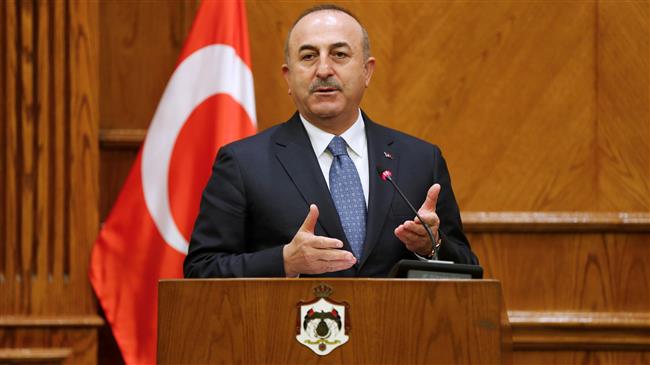

 This makes it easy to access the Press TV website
This makes it easy to access the Press TV website